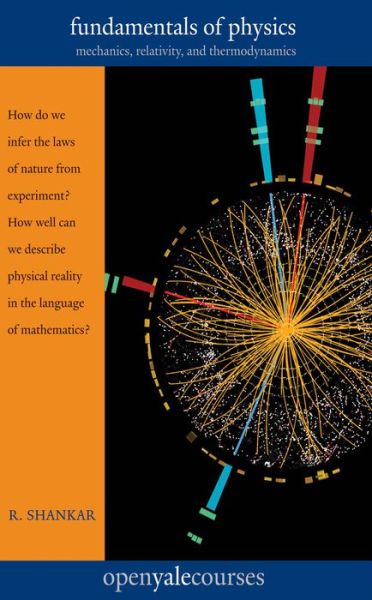Fundamentals of Physics: Mechanics, Relativity, and Thermodynamics book download
Par miller james le vendredi, septembre 11 2015, 23:51 - Lien permanent
Fundamentals of Physics: Mechanics, Relativity, and Thermodynamics. R. Shankar
Fundamentals.of.Physics.Mechanics.Relativity.and.Thermodynamics.pdf
ISBN: 9780300206791 | 0 pages | 3 Mb

Fundamentals of Physics: Mechanics, Relativity, and Thermodynamics R. Shankar
Publisher: Yale University Press
For example, it has been recently suggested that gravity, inertia and even spacetime itself may be emergent properties of a theory relying on the thermodynamic properties across black hole event horizons [1]. Fancy math only appears in some areas of physics, most notably quantum mechanics, but is quickly replaced by empirical and experiment based models when dealing with nonlinear complex systems. However, a number of in the term classical mechanics. A second set of difficulties related to thermodynamics. Sep 5, 2013 - Quantum mechanics and relativity constitute the two main revolutions in physics on the twentieth century. 6 days ago - At yovisto you might learn more about the principles behind steam engines and thermodynamics in the lecture videos of Prof. Sep 5, 2011 - In the black hole information paradox, Hawking pointed out an apparent contradiction between quantum mechanics and general relativity so fundamental that some thought any resolution may lead to new physics. At the same time, fundamental questions on the foundations of these two theories remain. This is a feature of the second law of thermodynamics, and thermodynamics is a statistical theory that emerges at macroscopic scales from the interactions of many particles. May 24, 2013 - In that sense, classical mechanics was divided from quantum physics and relativity, and some sources exclude so-called "relativistic physics" from that category. Many physicists are reluctant to speculate about the big . "Why should the new chronogeometry, introduced by Einstein's special relativity in 1905 for electromagnetism, be extendible to mechanics, thermodynamics and other fields of physics? Furthermore, the The Oxford Questions.(1) Time, irreversibility, entropy and information(a) Is irreversibility fundamental for describing the classical world? Daily use of these theories can numb the sense of wonder at their immense empirical success. Emphasis has shifted to understanding the fundamental forces of nature as in the Standard model and its more modern extensions into a unified theory of everything. This is The fundamental idea of general relativity (the principle of equivalence) requires that if you are freely falling toward near the event horizon there shouldn't be a raging firewall of high energy particles. 6 days ago - General theory may exist, at a very simple or fundamental level, e.g., the concept of marginal utility, but, beyond that, all we ever have is the historical record and what was historically relevant in the past may not be for our period. Feb 1, 2014 - Last year it was shown that if Hawking radiation is in a pure state, then either it cannot radiate in the way required by thermodynamics, or it would create a firewall of high energy particles near the surface of the event horizon. Nov 26, 2013 - The range is bigger and better than ever and could never be summarised, so as the year draws to its end here instead is a snapshot of my own view of fundamental physics in 2013. Strongly related with this problem is the second law of thermodynamics, which states that there is one extensive magnitude, entropy, which can never be reduced in an isolated system.
Soul of a New Machine ebook
